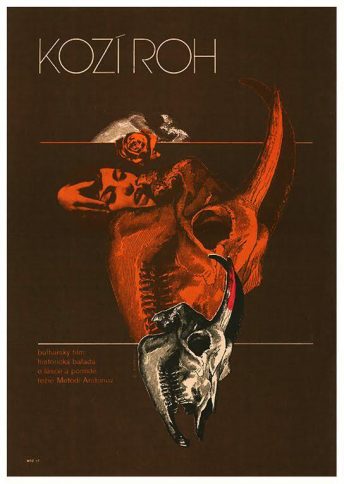 A rape-revenge drama from Bulgaria, and a most unlikely Great Film inductee. The undoubted masterpiece of the late Metodi Andonov (1932–1974), this 1972 film was heavily inspired by Ingmar Bergman’s classic THE VIRGIN SPRING (making it something of a companion-piece to another VIRGIN SPRING knock-off, the same year’s LAST HOUSE ON THE LEFT) but more than stands on its own.
A rape-revenge drama from Bulgaria, and a most unlikely Great Film inductee. The undoubted masterpiece of the late Metodi Andonov (1932–1974), this 1972 film was heavily inspired by Ingmar Bergman’s classic THE VIRGIN SPRING (making it something of a companion-piece to another VIRGIN SPRING knock-off, the same year’s LAST HOUSE ON THE LEFT) but more than stands on its own.
Based on a story by Nikolai Haitov, who also wrote the screenplay, THE GOAT HORN (KOZIJAT ROG) is reportedly the most popular Bulgarian film of all time, having been viewed by a third of the country’s population upon its initial release. That success would appear to be explained by the film’s still-audacious mixture of art and exploitation (for the record, it was remade in 1994 by director Nikolay Volev, in a much lesser film that leans more heavily toward the Art side of the fence).
As THE GOAT HORN begins an onscreen text informs us that “This bloody story happened in the 17th Century.” We’re introduced to Karaivan (Anton Gorchev), a shepherd living in a rural mountain community. One night when he’s out tending to his flock four miscreants, denizens of the Ottoman Empire that ruled Bulgaria, break into Karaivan’s house and rape and murder his wife; this occurs in full view of the couple’s young daughter Maria, who is rendered mute by the sight.
Arriving home the following morning, Karaivan is understandably nonplussed. He promptly burns down his house and leaves with Maria in tow, settling in a secluded mountainside cottage where Karaivan cuts his daughter’s hair short because “This world is not for women!”
Nine years pass. Maria, trained Sarah Conner-like by her embittered father, grows into a fierce warrior teen (Katya Paskaleva, who also plays the wife in the earlier scenes). The object: revenge.
During a masked ball father and daughter abduct one of their loved one’s killers. They take the man to a mountain top clearing where Karaivan beats him to death. Next they track two of the other attackers to their homes and kill ‘em. In all three cases Karaivan and Maria deliberately leave behind a telltale goat’s horn.
From there things grow complicated as Maria comes to resent her father’s autocratic rule, and finds herself hesitant about offing the fourth of her mother’s killers. She also canoodles with a rival shepherd, a romance to which Karaivan strongly disapproves, due in no small part to his barely-concealed incestuous longings (an angle that, incidentally, was vastly overstated in the 1994 remake).
There are political overtones in the depiction of Ottoman-occupied Bulgaria, and the fact that the rapists are all Turkish, but simplicity and directness are THE GOAT HORN’S primary virtues. The dialogue is extremely sparse, as is the soundtrack, consisting largely of wilderness ambiance and percussive music that matches the film’s presentation of the natural world.
As visualized by Metodi Andonov’s spare black and white imagery, that world is neither lush nor pretty. Rocky, downward-slanted (as seemingly every scene takes place on a mountain slope) and steeped in the rituals of 17th Century Bulgaria (represented by a funeral whose participants are called upon to run away from the grave in mass upon the corpse being dropped into it and an outdoor masked ball), this setting compliments the darkness of the narrative. So too the performances of Katya Paskaleva and Anton Gorchev, both of whom seem at home in the film’s stark, elemental universe.
Yet for all the artfulness and visual poetry in THE GOAT HORN, the exploitation angle is just as blatant. The rape that sets the narrative in motion matches that of the previous year’s STRAW DOGS in leering ugliness, and the violence of the later scenes is decidedly unflinching. We’re also presented with copious full frontal nudity by Ms. Paskaleva, who became a top Bulgarian star after appearing in this film, and with excellent reason.
Vital Statistics
THE GOAT HORN (KOZIJAT ROG)
Boyana Film/Sofia Film Studios
Director: Metodi Andonov
Producer: Nikola Velev
Screenplay: Nikolai Haitov
Cinematography: Dimo Kolarov
Editing: Svoboda Bychvarova
Cast: Anton Gorchev, Katia Paskaleva, Nevena Andonova, Milen Penev, Todor Adamov, Kliment Denchev, Stefan Mavrodiev, Marin Yanev, Krasimira Petrova
